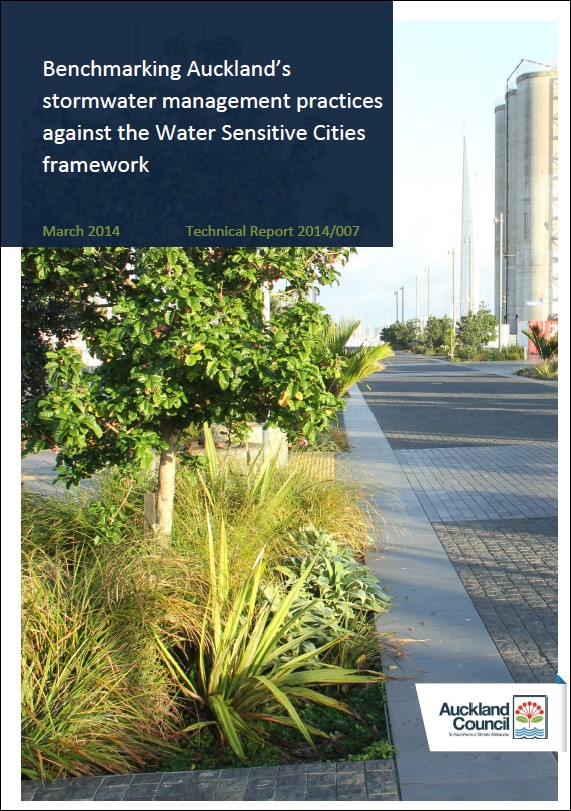Benchmarking Auckland’s stormwater management practice against the Water Sensitive Cities framework
Author:
Briony Ferguson, Rebekah Brown, Lara Werbeloff, Cooperative Research Centre for Water Sensitive CitiesSource:
Auckland Council Research and Evaluation Unit, RIMUPublication date:
2014Topics:
EnvironmentExtract from the Executive summary
Why benchmark stormwater management practice?
Stormwater management in Auckland has experienced considerable flux in recent years. The amalgamation of regional and district councils to establish Auckland Council as a unitary authority marked a significant change in the institutional arrangements for stormwater, requiring new accountabilities, policies, procedures and guidelines. The Auckland Plan now presents the region’s long-term strategic direction.
It is timely to consider how stormwater management practice can contribute to the articulated vision of Auckland as the world’s most liveable city. This project was commissioned by Auckland Council’s Stormwater Unit to inform the development of the 2015-45 Stormwater Asset Management Plan and other stormwater management activities of Auckland Council.
This report, by the Cooperative Research Centre for Water Sensitive Cities1, presents an assessment of stormwater management practice in Auckland, benchmarking the region’s current aspiration, policy and on-ground action against scientifically accepted world’s best practice for sustainable water management. It analyses Auckland’s transition towards its aspired city-state, identifies key challenges and proposes a strategy and suite of recommendations for advancing Auckland’s stormwater management towards a Water Sensitive City.
What is a Water Sensitive City?
Water management in 21st century cities has become increasingly challenging. The need to cater for population growth in the context of climate change projections, resource constraints, environmental degradation and evolving community expectations requires cities to look to more innovative responses in order to ensure continued liveability and resilience. The concept of a Water Sensitive City has emerged as a guiding vision for cities seeking to address these various challenges in a way that delivers a liveable and resilient city.
A Water Sensitive City is based on holistic management of the integrated water cycle to protect and enhance the health of receiving waterways, mitigate flood risk and create public spaces that harvest, clean and recycle water. It uses water management as a means of delivering better liveability outcomes more broadly, and recognises that a water sensitive approach to urban development and regeneration processes can help deliver on a range of objectives critical to the liveability of a city, such as biodiversity, public green space, healthy waterways, connected communities and cultural significance. Ultimately, a water sensitive approach is underpinned by a recognition that water can contribute to the creation of connected, vibrant and liveable communities. ...
Auckland Council technical report, TR2014/007
March 2014
